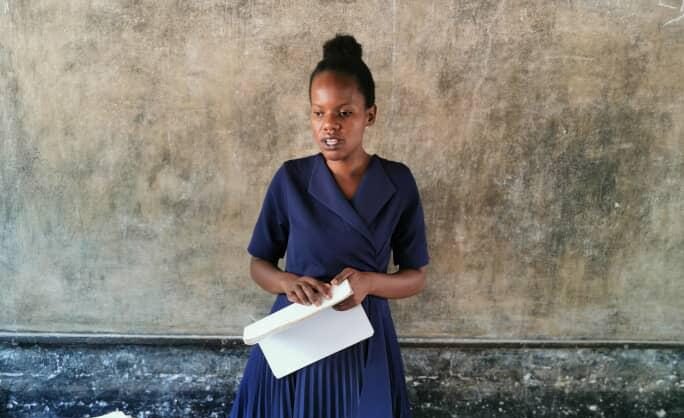Raising Local Voices: Caroline Kamulaga, Embracing Life with Vision Beyond Sight

Every day, persons with disabilities face systematic barriers, discrimination and stigma. Disability leaders worldwide are working tireless to reduce those barriers and strive for equal rights for all individuals. Prior to the USAID dismantling, IDP’s team in Malawi through the work of USAID’s Next Generation Early Grade Reading Activity had the pleasure of meeting Caroline Kamulaga. Below Caroline tells her story of her challenges and accomplishments being a teacher who is blind in Malawi.
Early Life and Education
My name is Caroline Kamulaga. I am 30 years old and am a public primary school teacher. I was born sighted to a lovely lady named Mevis. However, my infant years took a lot from me. I lost my sight at two years old due to cerebral malaria, and shortly after, I lost my mother. Both losses I do not remember as I was very young. What I know and what I remain grateful for are my brother, a soldier, and my strong family, who raised me with love. And now, I have my own daughter. I named her Chimwemwe, which means “happiness!”
My family was unaware of the schooling options available in Malawi, so I spent my early years at Murerwa Primary School in Zimbabwe, where part of my family resides. During this time, we focused on seeking medical attention from a specialist doctor to help me regain my sight. In 2006, when I was 11 years old and in Grade 6, my family became more informed about Malawi’s schooling options and realized that restoring my sight would not be possible. So, I returned home. I then continued my primary education at Montfort Primary School in Malawi. At Montfort, after our regular classes, we were taught essential life skills, such as washing clothes, cleaning kitchen utensils, and mopping the hostel. Although my family had always been protective and assisted me with basic chores, my school made me realize that I could manage these tasks independently.
However, in classes, the teachers and students struggled as there were challenges with teaching and learning materials (TLMs). Braille books were scarcely available, and braille paper was in short supply. Our friends often dictated textbook content to us, which became the norm. While in primary school, I recall friends who were dropped off at school by their families, and their families never returned for them. Sharing every resource, every snack, and every joyful moment was essential to make these friends feel loved.
Secondary Education
I studied very hard because I wanted to attend secondary school and prove that I, too, could be selected for a National Secondary School. True to my wishes, I was selected to attend Stella Marris Secondary School in 2009. It was a Catholic school, slightly more resourced than my primary school, and I felt a strong sense of belonging. With this newfound support, I had no reason to fail. My dream grew bigger: I aimed to attend a public university. So, I worked hard.
At Stella Marris, I enjoyed an inclusive learning and boarding environment, making friends with both sighted and visually impaired peers. The school had two resource teachers and 10 learners with visual impairments. The resource teachers further explained any content we missed in class, such as science experiments or labeled diagrams. They assisted us after school, though they were often overwhelmed.
Despite these challenges, I studied diligently with the goal of enrolling in a public university. Unfortunately, I did not achieve good grades on the national examination. I repeated a class and attempted the national exam again. This time, my grades improved, but they were still not high enough for public university selection.
Teacher Training Journey
My family encouraged me to enroll at a Teacher Training College. Once again, student handbooks were unavailable in braille, so my fellow student teachers would dictate notes to me. We had one resource lecturer for seven students and three computers equipped with JAWS software. However, the college had a shortage of braille paper due to a lack of government funding.
Teaching has been my passion since childhood. I viewed it as a social tool, enabling me to participate actively in my community, home, and school. I felt that with a teacher’s authority, I would be heard. Additionally, I wanted to gain knowledge, as we read extensively to prepare for lessons. During teaching practice, I felt liberated. I enjoyed lesson preparation, sharing with my colleagues, and having a job that offered some level of independence. Being addressed as “Madam Carol” was especially gratifying.
Professional Life
I received good grades for my teaching practice and was employed as a teacher in 2018 at Likuni Primary School, where I still teach today. Unfortunately, the challenges of lacking basic resources, like braille paper and TLMs in braille, persist. I continue to rely on my colleagues to read the teacher’s guide to me so I can develop lesson plans and work schemes. While the Ministry of Education provides braille paper, they usually do not provide enough, and these shortages mean I sometimes cannot write lesson plans. Additionally, the school environment is not accessible, and I depend on fellow teachers or learners to navigate from home to school and within the school grounds. At times, I attempt to use a cane, but I find the uneven terrain in my community and place of work difficult to navigate.
At Likui, I was chosen as the Punctuality Chair because of my consistent timeliness and presence at work. My students perform well academically and are also encouraged to come to school on time, at least before Madam Carol arrives!
Teamwork and Support at a Resource Center
At my school, we have some learners with various disabilities, particularly those with learning difficulties and visual impairments. In my teaching, I ensure that all students participate actively in my lessons and provide remedial classes whenever I identify a need. Though I’m not officially assigned to teach at the resource center, I visit it to socialize and engage with the learners.
My fellow teachers play a crucial role in this collaborative environment. They assist by writing notes on the board, writing down test questions, and marking tests or classwork. Whenever they encounter challenges and need my support, I am always available. We work hand in hand, freely assisting each other to create an inclusive and supportive learning environment.
Personal Life, Leadership and Advocacy
Three years ago, happiness arrived in the form of my daughter, Chimwemwe. As a single mother, I am grateful for my family’s support to raise her.
In addition to teaching, I am actively involved in various social activities within our community. I volunteer to read in church, which has inspired many parents to register their children for church activities. For the past eight years, I have been a member of the Association of Visually Impaired Christians, and this year, I was elected President. Our association aims to print the Bible and other church books in braille, and during my tenure, we have managed to raise 20% of the necessary funds for this project.
Future Aspirations
Next year, I plan to return to university to further my education. My goal is not to leave the teaching sector but to advance from the primary to the secondary level. Someday, I will start a foundation focusing on motivating and empowering others like me.
I continue to dream big because, despite my visual impairment, nothing will stop me from attaining the highest level of education in my field.
Conclusion
Throughout my journey, I have faced numerous challenges, from a shortage of braille resources to overcoming societal expectations. However, each obstacle has reinforced my belief in the power of perseverance and the strength within each of us.
Whether facing visual impairments or any other obstacles, you can overcome them with resilience and determination. Dream big, work hard, and remember that no hurdle is insurmountable. Through my journey, I have realized that our greatest achievements often emerge from our greatest struggles. Let my story inspire you to pursue your dreams and make a difference in the world.

